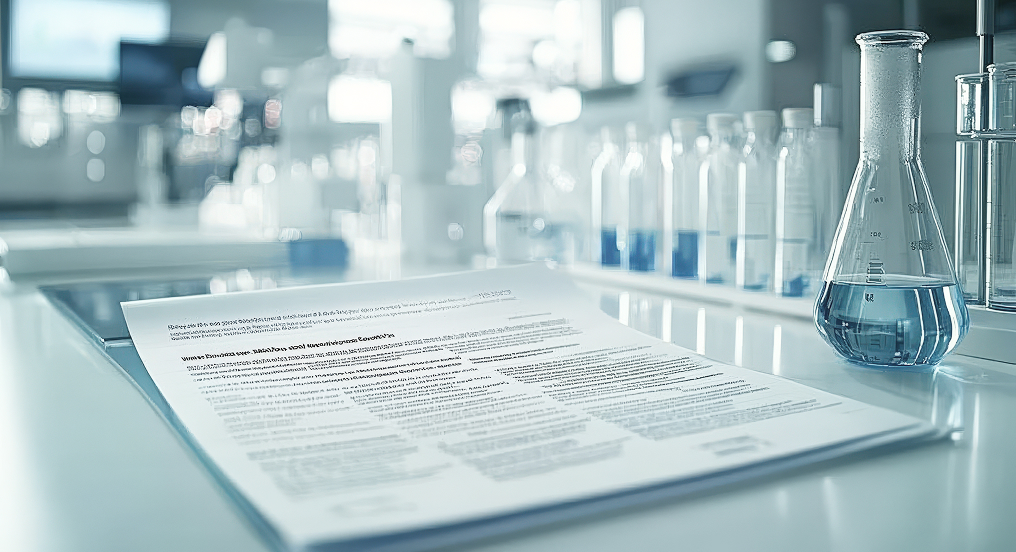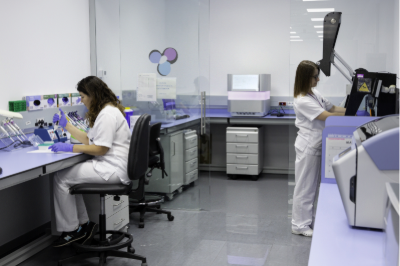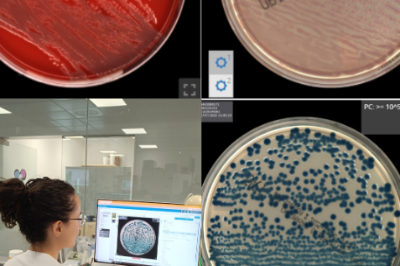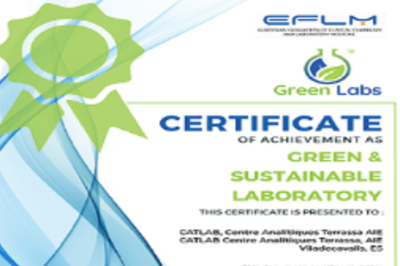News
Noteworthy news related to Catlab. Relevant current events, such as the appearance of new techniques, publications, courses, ...
Noteworthy news related to Catlab. Relevant current events, such as the appearance of new techniques, publications, courses, ...


Last March, we at Catlab conducted a new follow-up audit for the ISO 15189 standard by the National Accreditation Entity (ENAC), from which we received final approval this September. This new audit not only renewed our entire accreditation program, but also allowed us to expand our scope of accreditation, including: - NGS massive sequencing tests for genetic analysis of multiple pathologies such as hereditary cancer, neurology, and pediatrics. - Immunosuppressant studies using UHPLC-MS. - Analysis of oligoclonal bands, tryptase, fecal occult blood, and biological fluid studies. - As well as expanding our flexibility in cytometry testing. Catlab thus reaffirms its commitment to quality with data that supports us: - More than 1,000 accredited tests in all areas of the laboratory: biochemistry, microbiology, cytometry, immunology, genetics, hematology, emergency departments, and preanalytical services. -This represents more than 95% of all activity. -Having all our centers accredited, both the central laboratory and the emergency department.
29/09/2025
Know more

The clinical analysis laboratory Catlab has recently renovated its Genetics area with the incorporation of a new Next Generation Sequencing (NGS) equipment. This is an Illumina NextSeq 2000 equipment, which is already in operation and housed in a new area specially designed for its use. The aforementioned renovation has been carried out in parallel with an expansion of the Genetics and Molecular Microbiology spaces. Since the end of 2019, Catlab has been offering diagnostics based on Massive Sequencing or NGS. Initially, due to the high cost of the equipment, only the data analysis phase - drylab process - was incorporated. This ensured good service to patients and contributed to the expertise of professionals. Currently, the adjustment of the cost of high-capacity sequencing processes has allowed the laboratory to acquire this equipment with the aim of also controlling the complete processing of the sample, from reception to the generation of the results report (wetlab process). In addition, having the complete process of genetic analysis has allowed to obtain accreditation under the ISO 15189:2023 standard for NGS tests. Next Generation Sequencing: a new paradigm in genetic diagnosis In recent years, genetics has experienced an exponential growth in the clinical diagnosis of diseases whose genetic origin was previously unknown or for which the approach was technically very complex. “NGS has substantially changed the way genetic diagnosis is approached: thousands to millions of DNA molecules can be sequenced simultaneously using NGS and obtaining results in a very short time,” says Dr. Raül Santamaria, director of Catlab . The speed of technical advances in sequencing has made it possible to use exome sequencing or multi-gene panel sequencing as a first-line study in the diagnosis of hereditary genetic diseases. “Today, this approach is more cost-effective, faster and more efficient than partial sequencing of a few genes, and the introduction of this technology is therefore associated with a paradigm shift in the diagnostic process,” says Dr. Emma Triviño, head of the Genetics area at Catlab . Recently, NGS has undergone great improvements in reducing the complexity of the process, both technically and economically. “In the case of complex genetic diseases, these improvements must be linked to a thorough examination of the patient by the clinician and a structured transmission of the data of interest to the laboratory professionals”, adds Dr. Santamaria. “In addition, it is necessary to provide adequate pre -test counseling to the patient/family, good integration of clinical and laboratory findings in the results and, finally, post-test genetic counseling to patients with the result obtained”, details Dr. Triviño . Catlab Genetics team comments that "the incorporation of the new team has allowed us to internalize multiple determinations and the possibility, eventually, of addressing the diagnosis of any genetic-based disease. We work closely with clinicians to decide the appropriate approach in each case and provide patients with the best genetic counseling. " Catlab's long history has resulted in great expertise in the field of genetic diagnosis of neurological, cardiac, ophthalmological, dermatological diseases, developmental disorders, dysmorphology as well as hereditary cancer. Given the transversality of current genetics, Catlab has the optimal resources to provide service to all specialties. We work together with specialist physicians to approach each case in a personalized way, in order to provide the most precise and accurate result to patients and their families. In relation to Genetics as a whole, a project to integrate the Genetics laboratories of CatLab and the Consorci Sanitari de Terrassa has been carried out throughout 2025. This action unifies the processes and establishes a definitive formula for collaboration between two work teams with a high level of expertise. The integration allows the reference population in Genetics to expand to more than half a million inhabitants who will benefit from the most advanced techniques in both the study and the genetic counseling for patients and families. This expansion of the population allows us to have the best state-of-the-art equipment, highly trained professionals and to be a reference center in precision medicine for the entire population of Vallès Occidental Oest.
23/07/2025
Know more

Great progress in the Microbiology Laboratory of CATLAB with the implementation of automated lecture of urine cultures. The Microbiology Laboratory of CATLAB has incorporated an automation system for reading urine culture plates (urocultures), using the UCA system (Urine Culture Application) and the Synapsys software, integrated within the KIESTRA platform (BD). Clinical and operational benefits 1.Automated and standardized reading Reduction of subjective variability + Greater consistency in the interpretation of cultures 2. Improved efficiency and traceability Digital management of the whole process + Complete traceability of each sample 3. Shorter turn-around times Advance in obtaining preliminary results + Optimization of the microbiological workflow 4. Improvement in diagnostic quality Support for faster and more informed clinical decision-making + Especially relevant in the empirical management of urinary infections (UTIs) 5. Current application area Automated reading applied exclusively to urine cultures With this implementation, CATLAB continues to move towards a more digitized, safe, and efficient microbiology, putting technology at the service of healthcare.
15/07/2025
Know more
.png)
In 2024 we completed the project to improve the Preanalytical area and the core of the Biochemistry area by incorporating new preanalytical equipment, a new analysis chain for spectrophotometric and immunochemical techniques, and a postanalytical system consisting of 2 automated refrigerators, with a storage capacity of up to 27,000 samples each. All this has allowed us to optimize the production and management of the core, personalizing workflows and sample management; increasing automation, minimizing tasks without added value and reducing human errors, as well as improving efficiency in the healthcare process with the results delivered to doctors and patients. This Video shows the facilities and the history of the change.
16/04/2025
Know more

Catlab has achieved the "Green & Sustainable Laboratories" certification promoted by the European Federation of Clinical Chemistry and Laboratory Medicine (EFLM), becoming the first laboratory operating in the public sector in Spain to achieve this status and one of the few in all of Europe. This certification contributes to a sustainable healthcare system and ensures that laboratories are environmentally friendly, ensuring that resources are used efficiently from ecological, social, and economic perspectives, while providing high-quality services to patients. To achieve this certification, Catlab must: ✅ Adequate control of hazardous chemical products and reagents ✅ Manage energy and water to reduce consumption ✅ Proper management of waste generated in the laboratory from a sustainability perspective ✅ Involve suppliers throughout the entire process to reduce the carbon footprint. With this certification, we reinforce our commitment to excellence and social commitment, demonstrating that analytical quality and innovation can go hand in hand with respect for the environment and sustainability.
27/02/2025
Know more
There are 2 new readings of these newsletters available: -February: Procalcitonin and sepsis in the critically ill patient (click here) Sepsis is a life-threatening organ dysfunction caused by a dysregulated host response to a bacterial infection. Each hour of delay in diagnosis, attributable to lack of recognition during patient admission, is associated with a 7% reduction in survival. Procalcitonin (PCT) has revolutionized the management of sepsis, allowing for more accurate diagnosis and more efficient antibiotic management. The determination of PCT helps us to predict bacterial infection, distinguishing it from viral infections and other inflammatory processes, and differentiating between localized and systemic bacterial infections. -January: Multiple Myeloma Genetic Analysis (click here) Multiple myeloma (MM) is a hematological cancer that affects the plasma cells of the bone marrow and detection of chromosomal alterations is essential for its diagnosis and prognosis. Genetic abnormalities include primary changes such as IGH gene rearrangements and secondary changes such as TP53 deletion, which influence survival and response to treatment. A key tool for identifying these alterations is the fluorescent in situ hybridization (FISH) technique, which allows the detection of specific chromosomal abnormalities in plasma cells. At Catlab we perform the MultiFISH technique that facilitates the analysis of the most relevant genetic alterations in one go, improving the diagnosis and personalization of the treatment.
27/02/2025
Know more
Last April, the external certification audit for the UNE-EN ISO 14001:2015 standard was successfully passed at the "Laboratori Central de Viladecavalls". With the implementation of this standard, constant improvement in environmental management is promoted.
22/07/2022
Know more
Society's expectations for sustainable development, transparency and accountability have evolved in the context of increasingly stringent legislation, increasing pressure on environmental pollution, inefficient use of resources, mismanagement of resources, climate change, ecosystem degradation and biodiversity loss.This has led organizations to take a systematic approach to environmental management through the implementation of environmental management systems.It is in this context that the international standard ISO 14001 "Environmental Management Systems - Requirements with a focus on its use" aims to provide organizations with a frame of reference to protect the environment and respond to changing environmental conditions, in balance with socio-economic needs.
24/01/2022
Know more
ENAC (Entidad Nacional de Acreditación) has issued a release on the accreditation of the real-time PCR test for the detection of SARS-CoV-2 by Catlab. It is the first laboratory that can issue reports with the ENAC mark for this test in Spain. For years now, Catlab has had most of its activity accredited by the UNE-EN ISO 15189 standard, which ensures not only its quality management system, but also the technical competence of the equipment, and the personnel involved in the process.
04/11/2020
Know more
In this article from mon.cat, Catlab director Imma Caballé explains the experience of our Laboratory in carrying out PCR tests at the start of the pandemic, the results of the immunity studies, and the prospects for the near future.
29/06/2020
Know more
From early March, Catlab began to detect SARS-CoV-2, first using the PCR technique, and later with serologies.These videos briefly explain how these techniques are performed and Catlab's involvement in detecting and monitoring COVID19 disease.- Covid19 i Catlab (1). El laboratori amb més activitat acreditada- Covid19 i Catlab (2). Abast territorial- Covid19 i Catlab (3). La PCR de SARS-CoV-2- Covid19 i Catlab (4). Projectes i estudis
18/06/2020
Know more
In this article from ARA, Catlab microbiologist Emma Padilla talks about the usefulness of current serological tests; of rapid tests and their reliability, and the strategies to estimate seroprevalence.
24/04/2020
Know more